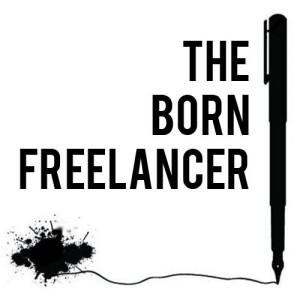The Born Freelancer on Not Sharing Unmerited Credit
This series of posts by the Born Freelancer shares personal experiences and thoughts on issues relevant to freelancers. Have something to add to the conversation? We’d love to hear from you in the comments.

Earlier this year I wrote about protecting your ideas while still participating in the rough and tumble world of freelancing.
One of the best ways to do that is to make them as uniquely your own as possible. This becomes increasingly more practical as your brand becomes better known.
But it’s also important to use caution when collaborating with others in order to bring your ideas into the marketplace.
I would like to share a cautionary tale to illustrate the type I hope you never have to suffer.
This particular collaboration necessitated the sharing of “creative intel,” not with another writer but with an actor in order to try and sell a project. Having a recognized actor associated with a speculative script (especially in the world of episodic television) can help “green-light” a worthy but otherwise anonymous project.
These associations are usually mutually profitable. They can be the beginning of lifelong associations that eventually benefit all parties. Sometimes they fizzle out despite everyone’s best efforts. And, on occasion, they can be problematic.
In creative collaborations of all kinds, safeguards should be introduced early in the process so as not to jeopardize the health of a project, not to mention its creator.
Credit where credit is not due
A freelance writer colleague of mine once toiled long and hard over an episodic television concept, slaving to generate a “bible” (a document outlining plot, characters and future storylines).
His friend, an actor who had small but impressive credits, would join him from time to time for coffee and ask how things were going.
It seemed to the writer they were just passing the time.
Eventually it emerged that his friend thought there was potential in the project and could see himself playing the title role.
He began to offer random ideas, thoughts that were generally unusable. Still, when you are floundering in the freelancing darkness, any friendly encouragement is welcome.
Then came the seemingly benign offer.
The friend suggested the project would have more “clout” if they went in as “partners” – the friend using his acting reputation to open a few doors, the writer supplying the ideas. It was understood that any producer buying the series would be buying it with the friend attached to the project playing the starring role.
They put nothing in writing.
The friend had one other suggestion. It seemed unfair to him, he argued, that there was no tangible evidence of his attachment to the project. Would the writer object if his name was added to the writer’s on the pitch?
The writer wasn’t 100% comfortable but trusted his friend. So both their names went on the documents and they submitted the pitch.
Be careful what you ask for…
Many producers passed.
Eventually one requested a meeting and, as agreed, both the writer and his friend attended.
Successful at long last, the producer commissioned a pilot from the writer with the friend in the lead.
Come the post-pilot autopsy, it was decided the series would go ahead but with one major change.
The actor was out and another was in.
Needless to say, he was not pleased.
The writer, meanwhile, was busy writing and overseeing scripts. He offered to co-write one with his friend but his friend declined, stating he had other plans.
So it came as a shock to the writer as production began to learn that his friend was claiming co-creatorship of the series based upon his name also being on the original “bible” and pitch documents. If he couldn’t star in it, he honestly believed, he deserved something for all his efforts.
In their final phone call, ever, the writer pointed out that his friend hadn’t actually co-written anything. His name was on the bible and pitch documents as a courtesy, remember, to help sell the series?
His friend genuinely appeared to remember things different. In his mind they had created it together.
Needless to say, the writer was furious. Only now could he see his naivety.
The producers didn’t want to know. Sort it out yourselves, they said.
The writer’s union suggested he contact a lawyer who suggested he just accept it if he didn’t want a huge legal bill.
And so the series went to air for one full season with a different actor in the lead and two co-creators on the credits. Two cheques were cut every week, each for less than the full amount one would get solo.
The writer and his friend never spoke again.
Who was right? Who was wrong?
At this point nobody can ever be 100% sure.
All one can say for certain is that the situation should have never happened in the first place.
The takeaway
When it comes to creators protecting our ideas, we must first and foremost put them in writing.
A verbal agreement, such as described in this post, could have been easily put into writing as a “letter of understanding” between the two friends. It could have defined and clarified their relationship in the event of a sale.
It would have avoided the later conflict entirely.
Whether collaborating with a performer, an artist or another writer, under no circumstances should a creative credit be put in writing unless it is merited. Unwarranted crediting can negatively impact future payments, claims to copyright and a creator’s professional brand.
If a writer willingly allows such appropriation to take place, then their ideas have not been stolen.
They’ve been thrown away.



